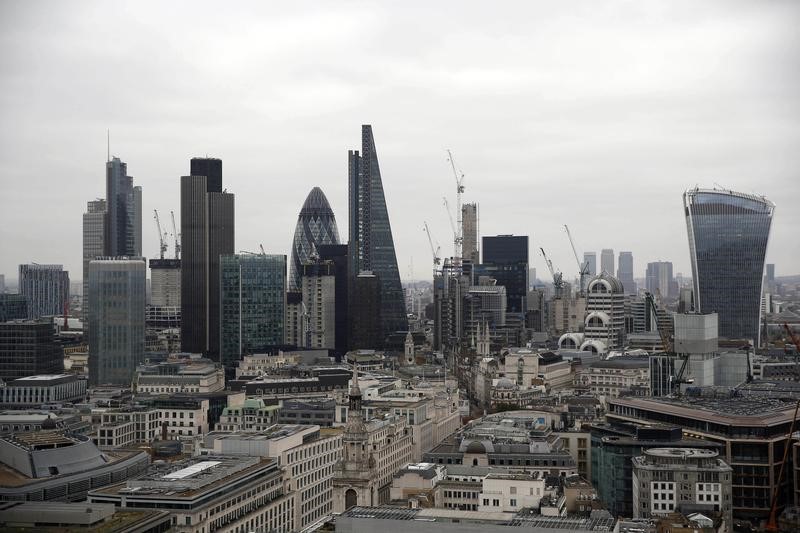By Andy Bruce
LONDON (Reuters) - Britain's economy has probably slowed from its strong growth of late last year and a cooling jobs market and hefty price increases will become increasingly apparent as Brexit gets underway, according to a survey published on Wednesday.
The Markit/CIPS Services Purchasing Managers' Index (PMI), a closely watched gauge of Britain's services industry, rose to a three-month high of 55.0 in March from 53.3 in February.
That topped all forecasts in a Reuters poll of economists, whose median forecast was for a reading of 53.5, pushing sterling almost half a cent higher against the dollar. [GBP/]
But there were some warning signals as Britain begins the two-year process of leaving the European Union.
Services companies raised their selling prices at the fastest pace since 2008, a sign that inflation may rise more than the 3 percent expected by many forecasters this year. Businesses hired people at the slowest pace in seven months.
Taken together, the PMIs for manufacturing, construction and services published this week suggest economic growth will slow to around 0.4 percent in the first quarter from 0.7 percent in the fourth quarter of 2016, data firm IHS Markit said.
Growth of 0.4 percent would be in line with the most recent Reuters poll of economists but slower than the 0.6 percent predicted by the Bank of England.
"The PMI does not cover the retail sector, and hence may be overestimating growth somewhat given the concentrated hit in that area," JPMorgan (NYSE:JPM) economist Allan Monks said.
But conditions outside Britain had clearly improved and there was uncertainty about how quickly consumers will respond to higher prices, he said in a note to clients.
The BoE is widely expected to keep interest rates at their record low throughout this year and possibly until 2019 as it steers the British economy through the uncertainty linked to the exit from the EU.
However, one rate-setter voted last month for a rate increase and others said they might follow suit soon if there were signs that economy was maintaining its momentum of 2016.
Despite the stronger-than-expected headline growth figure in Wednesday's PMI, the survey also suggested consumers were cutting back on luxuries. Hotels and restaurants, gyms and hairdressers ranked among the worst-performing services in the first three months of 2017.
"Much of the disappointment in growth so far this year has been evident in consumer-oriented sectors, in part linked to spending and incomes being squeezed by higher prices," said Chris Williamson, chief business economist at IHS Markit.
Official data on Wednesday showed modest improvement for one of Britain's most persistent economic headaches, weak productivity.
Output-per-hour grew at the fastest pace in more than a year in the final three months of 2016, but remained well below the average rate seen before the financial crisis.
The figures did little to challenge expectations that 2017 will be a tough one for many Britons.
Nearly half of British households plan to cut spending as worries about inflation escalate, according to a separate survey on Wednesday from pension provider Scottish Friendly and the think tank Social Market Foundation.
Official data last week showed real household disposable income - a measure of spending power in the fourth quarter of 2016 - saw its biggest quarter-on-quarter decline in nearly three years.
Industry figures for new car registrations bucked other signs of weakening consumer demand, with sales rising 8.4 percent last month. But the surge in part reflected customers bringing forward purchases to beat a tax rise, which may bode for a weak April, the Society of Motor Manufacturers and Traders said.

The all-sector PMI, covering manufacturing, construction and services, rose a full point to 54.7 in March.